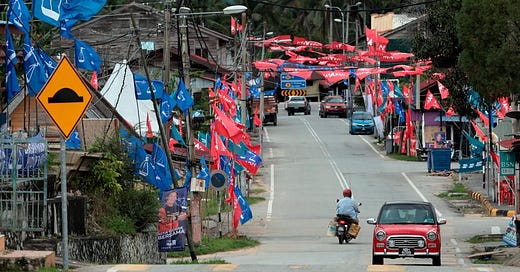Negeri Sembilan may be a bridge too far for PN
However, it won’t be plain sailing for PH and BN, which must still be very wise when allocating seats.
Negeri Sembilan is a very diverse state, just south of Klang Valley. It has industrial estates, palm oil estates, cement quarrying, tourist precincts, and a large spread of rural kampongs.
The population of Negeri Sembilan just reaches 1,100,000 people, where approximately 720,000 are eligible to vote in the coming state election, due before October this year. Negeri Sembilan is ethnically diverse with 56.6 percent of the population Malay, mainly Minangkabau, other Bumiputera groups making up 2.0 percent, with Chinese at 21.3 percent, and Indians at 14 percent. These groups are not uniformly dispersed throughout the state, and thus the ethnic mix influences electoral outcomes.
The current state government is Pakatan Harapan (PH), holding 20 seats in the state legislature, with the Barisan Nasional (BN) in opposition, holding 16 seats in the assembly. Both coalitions have combined to form a federal ‘unity government’ after GE15. In the coming state election, both groups are set to combine and run as a ‘unity coalition’.
The latest information is that both parties will run their respective candidates according to the seats they won in the 2018 state election, although this is not conformed.
Perikatan Nasional (PN) didn’t win any federal seats in Negeri Sembilan in GE15. Both PH and BN were untouchable by the so called ‘greenwave’. Nor did PN win any state seats in the last state election.
Although the PN leadership has pledged to capture the state in the coming state election, this might just be a ‘bridge too far.’
PH have the reasonably popular federal transport minister Anthony Loke, who holds the state seat of Chennah, and former Menteri Besar Mohamed Hasan, in the seat of Rantau, who is also federal defence minister, and the deputy president of UMNO to lead the campaign.
However, PAS has long nurtured kampong communities all over the central, south west, and south of the state. Support for PN in the seats of Sungei Lui, Seri Menanti, Senaling, Pilah, Johol, Labu, Puroi, Chembong, Gemas, and Gemencheh, can’t be underestimated.
If PN performed above expectations, this would give them up to 11 seats. However, this would be well short of the 19 seats needed to form a government. Nevertheless, this would embarrass the PH-BN coalition, who has no PN assembly members prior to the election.
The most likely result is that PN may be able to pick up a couple of seats in Negeri Sembilan, and sit isolated in a PH-BN packed assembly.
It would be very difficult for PN to pick up non-Malay votes, with the history of racial ranting by PAS that has gone on of late. This could possibly scare the non-Malay vote. PN could run some Gerakan candidates in Chinese majority seats. However, Gerakan isn’t strong in Negeri Sembilan.
PH-BN weaknesses are in the cost of living and welfare areas, where there are still large pockets of relative poverty in some areas, particularly within Indian communities in the estates. This could provide some backlash in the Indian vote, which may be important in some seats.
The crucial issue is how BN will look to its traditional Malay base, working alongside the DAP. This could setback UMNO against Bersatu and PAS, canvassing for the Malay votes. This is particularly important as UMNO, as seen from GE15 is currently in the electoral doldrums.
The seat allocation between PH and BN will be very important towards maximising their aggregate vote. This will have a major bearing over the election result.
We will also observe whether the charging of Muhyiddin Yassin creates any ‘Abah factor’, of a leader who has been politically persecuted. This will be the first time to see if his pending prosecution plays any role in the result. Finally, if there is any movement on the ‘Najib pardon’ issue, there could be massive repercussions. Expect this issue to go quiet for the next couple of months.
Although we can expect a swing against PH-BN, from the 2018 result, this will not be enough for PN to take a couple of seats away from the ‘unity coalition’.
Originally published in FMT 23rd April 2023
Subscribe Below:





If sembrong mp leave umno followed by bera mp who can do the same, mca and mic may leave bn coalition. Since sabah umno are not subjected to the anti hopping law, the 6 umno mp there may leave bn. Grs and gps will not stay with ph as a coalition partner should bn is broken. Hence ph madani government may not have the majority needed and king may dissolve parliament even before the n9 state election.
One can imagine if ge 16 in july, 50 seats each to pas and bersatu, gps grs and the rest will also put ph in trouble.
🤔😯🤣